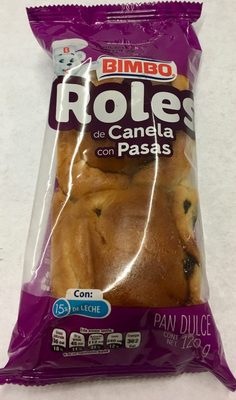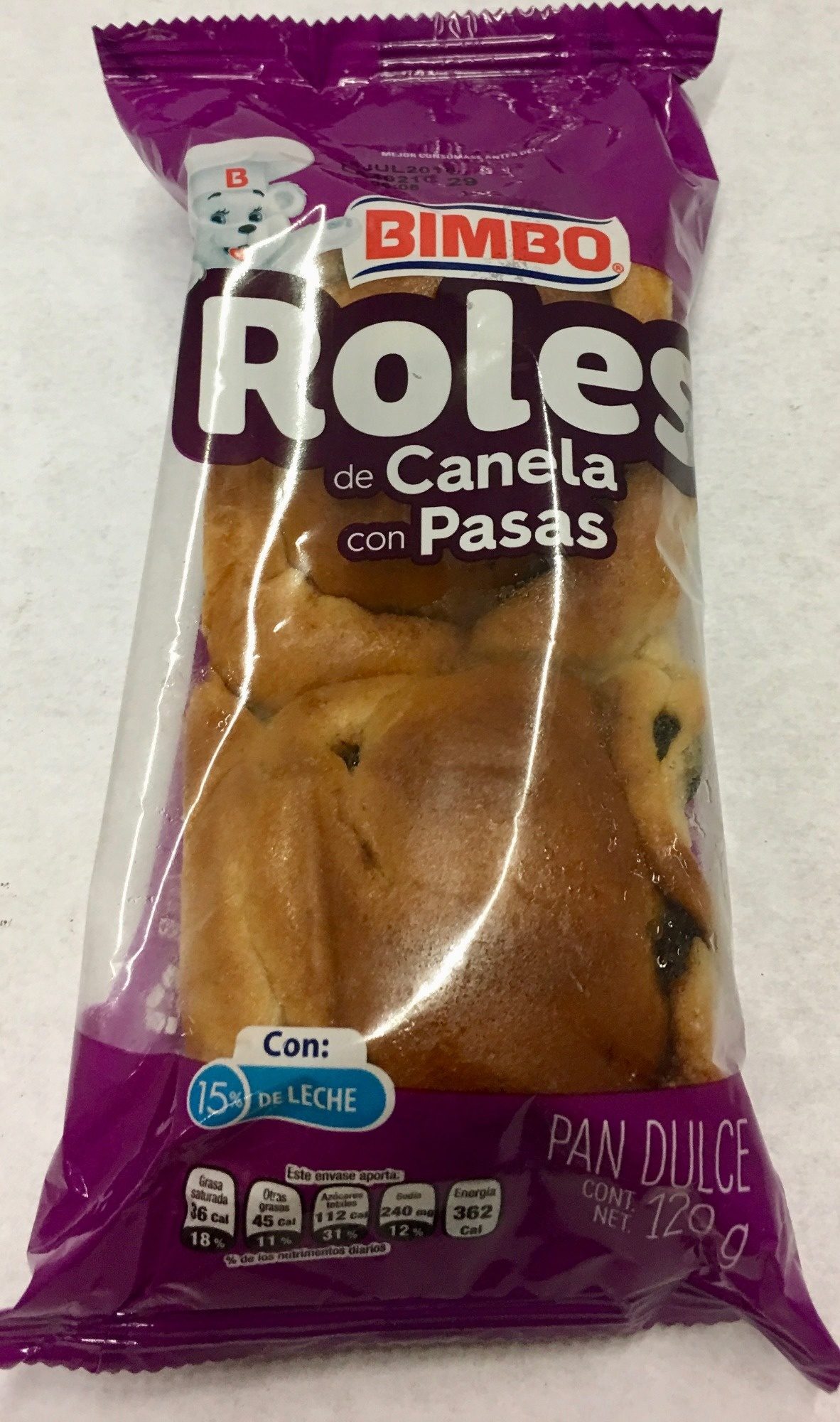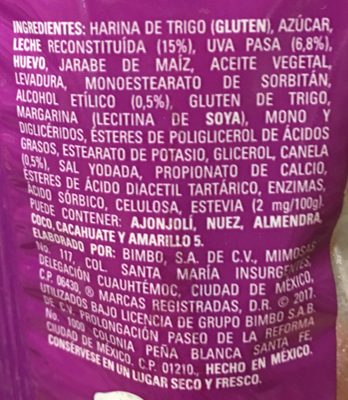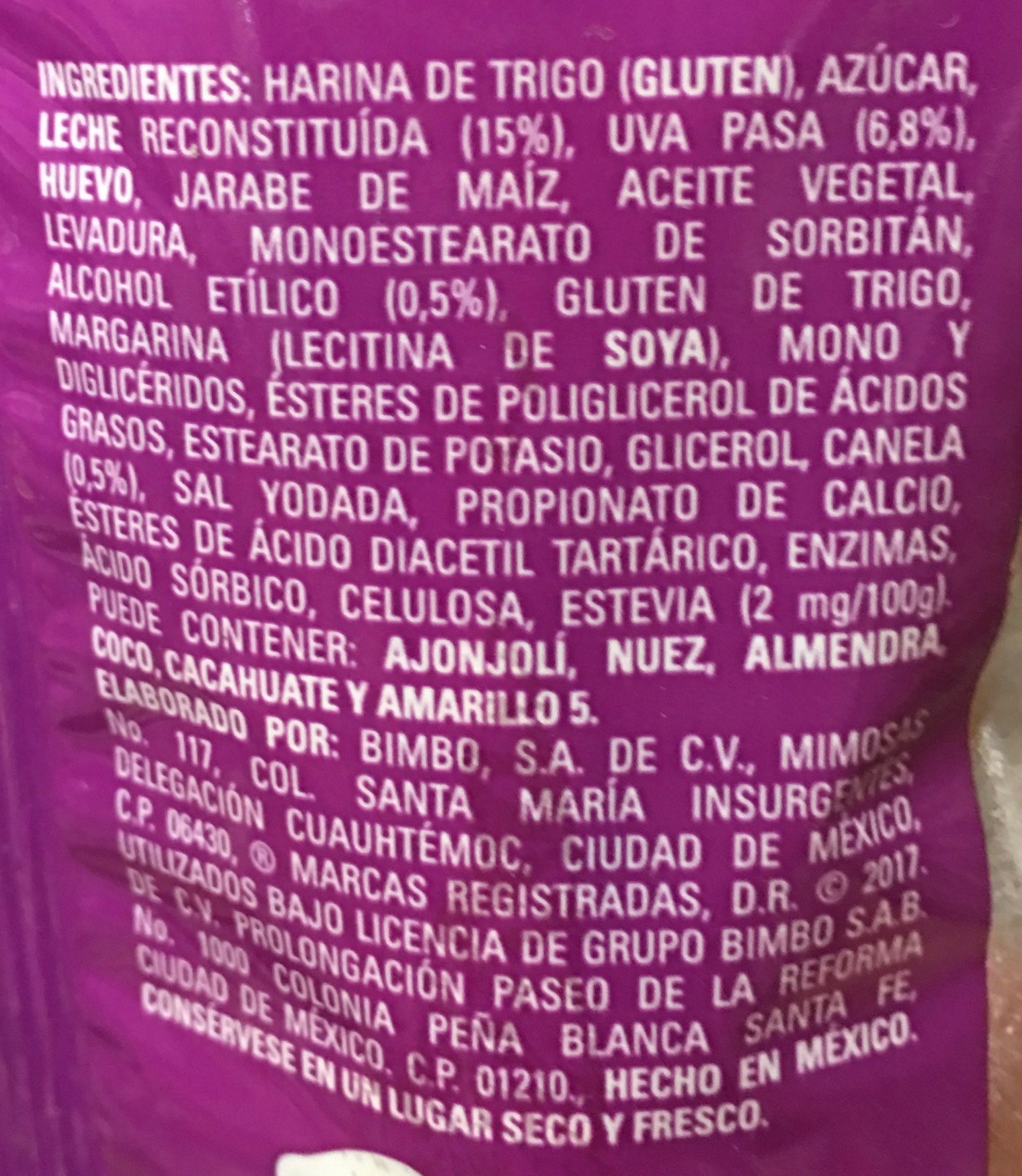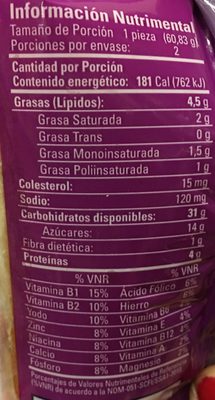Help us make food transparency the norm!
As a non-profit organization, we depend on your donations to continue informing consumers around the world about what they eat.
The food revolution starts with you!
ROLES BIMBO - 120 g
ROLES BIMBO - 120 g
This product page is not complete. You can help to complete it by editing it and adding more data from the photos we have, or by taking more photos using the app for Android or iPhone/iPad. Thank you!
×
Barcode: 7501000112128 (EAN / EAN-13)
Common name: ROLES DE CANELA CON PASAS
Quantity: 120 g
Packaging: es:BOLSA DE PLÁSTICO
Brands: BIMBO
Categories: es:PAN DE CANELA
Origin of ingredients: es:CIUDAD DE MÉXICO
Manufacturing or processing places: CIUDAD DE MÉXICO
Traceability code: BM-91254-01-J17
Link to the product page on the official site of the producer: https://www.bimbo.com.mx/es
Stores: WALMART, SUPERAMA, BODEGA AURRERÁ, SAM'S CLUB, CITY CLUB, SORIANA, MERCADO SORIANA, CHEDRAUI, LA COMERCIAL, ABARROTES, OXXO, KIOSKO
Countries where sold: Mexico
Matching with your preferences
Health
Ingredients
-
29 ingredients
: INGREDIENTES: HARINA DE TRIGO (GLUTEN), AZÚCAR LECHE RECONSTITUİDA (15%), UVA PASA (6,8%), HUEVO, JARABE DE MAÍZ, ACEITE VEGETAL, LEVADURA, MONOESTEARATO DE SORBITÁN, ALCOHOL ETÍLICO (0.5%), GLUTEN DE TRIGO, MARGARINA (LECITINA DE SOYA), MONO Y DIGLICERIDOS, ÉSTERES DE POLIGLICEROL DE ÁCIDOS GRASOS, ESTEARATO DE POTASIO, GLİCEROL, CANELA (0.5%), SAL YODADA, PROPIONATO DE CALCIO, ÉSTERES DE ÁCIDO DIACETIL TARTÁRICO, ENZIMAS. ÁCIDO SÓRBICO, CELULOSA, ESTEVIA (2 mg./100 g.). PUEDE CONTENER: AJONJOLÍ, NUEZ, ALMENDRA, COCO, CACAHUATE Y AMARILLO 5.Allergens: Eggs, Gluten, Milk, Nuts, Peanuts, Sesame seeds, Soybeans, es:amarillo-5, es:cocoTraces: Eggs, Nuts, Peanuts, Sesame seeds
Food processing
-
Ultra processed foods
Elements that indicate the product is in the 4 - Ultra processed food and drink products group:
- Additive: E322 - Lecithins
- Additive: E460 - Cellulose
- Additive: E960 - Steviol glycosides
- Ingredient: Gluten
Food products are classified into 4 groups according to their degree of processing:
- Unprocessed or minimally processed foods
- Processed culinary ingredients
- Processed foods
- Ultra processed foods
The determination of the group is based on the category of the product and on the ingredients it contains.
Additives
-
E1510 - Ethanol
Ethanol: Ethanol, also called alcohol, ethyl alcohol, grain alcohol, and drinking alcohol, is a chemical compound, a simple alcohol with the chemical formula C2H5OH. Its formula can be also written as CH3−CH2−OH or C2H5−OH -an ethyl group linked to a hydroxyl group-, and is often abbreviated as EtOH. Ethanol is a volatile, flammable, colorless liquid with a slight characteristic odor. It is a psychoactive substance and is the principal type of alcohol found in alcoholic drinks. Ethanol is naturally produced by the fermentation of sugars by yeasts or via petrochemical processes, and is most commonly consumed as a popular recreational drug. It also has medical applications as an antiseptic and disinfectant. The compound is widely used as a chemical solvent, either for scientific chemical testing or in synthesis of other organic compounds, and is a vital substance used across many different kinds of manufacturing industries. Ethanol is also used as a clean-burning fuel source.Source: Wikipedia
-
E200 - Sorbic acid
Sorbic acid: Sorbic acid, or 2‚4-hexadienoic acid, is a natural organic compound used as a food preservative. It has the chemical formula CH3-CH-4CO2H. It is a colourless solid that is slightly soluble in water and sublimes readily. It was first isolated from the unripe berries of the Sorbus aucuparia -rowan tree-, hence its name.Source: Wikipedia
-
E282 - Calcium propionate
Calcium propanoate: Calcium propanoate or calcium propionate has the formula Ca-C2H5COO-2. It is the calcium salt of propanoic acid.Source: Wikipedia
-
E322 - Lecithins
Lecithins are natural compounds commonly used in the food industry as emulsifiers and stabilizers.
Extracted from sources like soybeans and eggs, lecithins consist of phospholipids that enhance the mixing of oil and water, ensuring smooth textures in various products like chocolates, dressings, and baked goods.
They do not present any known health risks.
-
E322i - Lecithin
Lecithins are natural compounds commonly used in the food industry as emulsifiers and stabilizers.
Extracted from sources like soybeans and eggs, lecithins consist of phospholipids that enhance the mixing of oil and water, ensuring smooth textures in various products like chocolates, dressings, and baked goods.
They do not present any known health risks.
-
E460 - Cellulose
Cellulose: Cellulose is an organic compound with the formula -C6H10O5-n, a polysaccharide consisting of a linear chain of several hundred to many thousands of β-1→4- linked D-glucose units. Cellulose is an important structural component of the primary cell wall of green plants, many forms of algae and the oomycetes. Some species of bacteria secrete it to form biofilms. Cellulose is the most abundant organic polymer on Earth. The cellulose content of cotton fiber is 90%, that of wood is 40–50%, and that of dried hemp is approximately 57%.Cellulose is mainly used to produce paperboard and paper. Smaller quantities are converted into a wide variety of derivative products such as cellophane and rayon. Conversion of cellulose from energy crops into biofuels such as cellulosic ethanol is under development as a renewable fuel source. Cellulose for industrial use is mainly obtained from wood pulp and cotton.Some animals, particularly ruminants and termites, can digest cellulose with the help of symbiotic micro-organisms that live in their guts, such as Trichonympha. In human nutrition, cellulose is a non-digestible constituent of insoluble dietary fiber, acting as a hydrophilic bulking agent for feces and potentially aiding in defecation.Source: Wikipedia
-
E960 - Steviol glycosides
Steviol glycoside: Steviol glycosides are the chemical compounds responsible for the sweet taste of the leaves of the South American plant Stevia rebaudiana -Asteraceae- and the main ingredients -or precursors- of many sweeteners marketed under the generic name stevia and several trade names. They also occur in the related species Stevia phlebophylla -but in no other species of Stevia- and in the plant Rubus chingii -Rosaceae-.Steviol glycosides from Stevia rebaudiana have been reported to be between 30 and 320 times sweeter than sucrose, although there is some disagreement in the technical literature about these numbers. They are heat-stable, pH-stable, and do not ferment. Additionally, they do not induce a glycemic response when ingested, because humans can not metabolize stevia. This makes them attractive as natural sugar substitutes for diabetics and other people on carbohydrate-controlled diets. Steviol glycosides stimulate the insulin secretion through potentiation of the β-cell, preventing high blood glucose after a meal. The acceptable daily intake -ADI- for steviol glycosides, expressed as steviol equivalents, has been established to be 4 mg/kg body weight/day, and is based on no observed effects of a 100 fold higher dose in a rat study.Source: Wikipedia
Ingredients analysis
-
May contain palm oil
Ingredients that may contain palm oil: Vegetable oil
-
Non-vegan
Non-vegan ingredients: EggSome ingredients could not be recognized.
We need your help!
You can help us recognize more ingredients and better analyze the list of ingredients for this product and others:
- Edit this product page to correct spelling mistakes in the ingredients list, and/or to remove ingredients in other languages and sentences that are not related to the ingredients.
- Add new entries, synonyms or translations to our multilingual lists of ingredients, ingredient processing methods, and labels.
If you would like to help, join the #ingredients channel on our Slack discussion space and/or learn about ingredients analysis on our wiki. Thank you!
-
Vegetarian status unknown
Unrecognized ingredients: es:ingredientes, es:azucar-leche-reconstitui̇da, es:monoestearato-de-sorbitan, Margarine, es:mono-y-digliceridos, es:esteres-de-poliglicerol-de-acidos-grasos, es:estearato-de-potasio, es:gli̇cerol, es:esteres-de-acido-diacetil-tartarico, es:2-mgSome ingredients could not be recognized.
We need your help!
You can help us recognize more ingredients and better analyze the list of ingredients for this product and others:
- Edit this product page to correct spelling mistakes in the ingredients list, and/or to remove ingredients in other languages and sentences that are not related to the ingredients.
- Add new entries, synonyms or translations to our multilingual lists of ingredients, ingredient processing methods, and labels.
If you would like to help, join the #ingredients channel on our Slack discussion space and/or learn about ingredients analysis on our wiki. Thank you!
-
Details of the analysis of the ingredients
We need your help!
Some ingredients could not be recognized.
We need your help!
You can help us recognize more ingredients and better analyze the list of ingredients for this product and others:
- Edit this product page to correct spelling mistakes in the ingredients list, and/or to remove ingredients in other languages and sentences that are not related to the ingredients.
- Add new entries, synonyms or translations to our multilingual lists of ingredients, ingredient processing methods, and labels.
If you would like to help, join the #ingredients channel on our Slack discussion space and/or learn about ingredients analysis on our wiki. Thank you!
: INGREDIENTES (HARINA DE TRIGO), AZÚCAR LECHE RECONSTITUİDA 15%, UVA PASA 6.8%, HUEVO, JARABE DE MAÍZ, ACEITE VEGETAL, LEVADURA, MONOESTEARATO DE SORBITÁN, ALCOHOL ETÍLICO 0.5%, GLUTEN DE TRIGO, MARGARINA (LECITINA DE SOYA), mono- y DIGLICERIDOS, ÉSTERES DE POLIGLICEROL DE ÁCIDOS GRASOS, ESTEARATO DE POTASIO, GLİCEROL, CANELA 0.5%, SAL YODADA, PROPIONATO DE CALCIO, ÉSTERES DE ÁCIDO DIACETIL TARTÁRICO, ENZIMAS, ÁCIDO SÓRBICO, CELULOSA, ESTEVIA (2 mg), COCO, CACAHUATE, AMARILLO 5- INGREDIENTES -> es:ingredientes - percent_min: 35.2 - percent_max: 71.7
- HARINA DE TRIGO -> en:wheat-flour - vegan: yes - vegetarian: yes - ciqual_proxy_food_code: 9410 - percent_min: 35.2 - percent_max: 71.7
- AZÚCAR LECHE RECONSTITUİDA -> es:azucar-leche-reconstitui̇da - percent_min: 15 - percent: 15 - percent_max: 15
- UVA PASA -> en:raisin - vegan: yes - vegetarian: yes - ciqual_food_code: 13046 - percent_min: 6.8 - percent: 6.8 - percent_max: 6.8
- HUEVO -> en:egg - vegan: no - vegetarian: yes - ciqual_food_code: 22000 - percent_min: 0.5 - percent_max: 6.8
- JARABE DE MAÍZ -> en:corn-syrup - vegan: yes - vegetarian: yes - ciqual_proxy_food_code: 31089 - percent_min: 0.5 - percent_max: 6.8
- ACEITE VEGETAL -> en:vegetable-oil - vegan: yes - vegetarian: yes - from_palm_oil: maybe - percent_min: 0.5 - percent_max: 6.8
- LEVADURA -> en:yeast - vegan: yes - vegetarian: yes - percent_min: 0.5 - percent_max: 6.8
- MONOESTEARATO DE SORBITÁN -> es:monoestearato-de-sorbitan - percent_min: 0.5 - percent_max: 6.8
- ALCOHOL ETÍLICO -> en:e1510 - vegan: yes - vegetarian: yes - percent_min: 0.5 - percent: 0.5 - percent_max: 0.5
- GLUTEN DE TRIGO -> en:wheat-gluten - vegan: yes - vegetarian: yes - percent_min: 0.5 - percent_max: 0.5
- MARGARINA -> en:margarine - percent_min: 0.5 - percent_max: 0.5
- LECITINA DE SOYA -> en:soya-lecithin - vegan: yes - vegetarian: yes - ciqual_food_code: 42200 - percent_min: 0.5 - percent_max: 0.5
- mono- y DIGLICERIDOS -> es:mono-y-digliceridos - percent_min: 0.5 - percent_max: 0.5
- ÉSTERES DE POLIGLICEROL DE ÁCIDOS GRASOS -> es:esteres-de-poliglicerol-de-acidos-grasos - percent_min: 0.5 - percent_max: 0.5
- ESTEARATO DE POTASIO -> es:estearato-de-potasio - percent_min: 0.5 - percent_max: 0.5
- GLİCEROL -> es:gli̇cerol - percent_min: 0.5 - percent_max: 0.5
- CANELA -> en:cinnamon - vegan: yes - vegetarian: yes - percent_min: 0.5 - percent: 0.5 - percent_max: 0.5
- SAL YODADA -> en:iodised-salt - vegan: yes - vegetarian: yes - ciqual_food_code: 11058 - percent_min: 0 - percent_max: 0.5
- PROPIONATO DE CALCIO -> en:e282 - vegan: yes - vegetarian: yes - percent_min: 0 - percent_max: 0.5
- ÉSTERES DE ÁCIDO DIACETIL TARTÁRICO -> es:esteres-de-acido-diacetil-tartarico - percent_min: 0 - percent_max: 0.5
- ENZIMAS -> en:enzyme - vegan: maybe - vegetarian: maybe - percent_min: 0 - percent_max: 0.5
- ÁCIDO SÓRBICO -> en:e200 - vegan: yes - vegetarian: yes - percent_min: 0 - percent_max: 0.5
- CELULOSA -> en:e460 - vegan: yes - vegetarian: yes - percent_min: 0 - percent_max: 0.5
- ESTEVIA -> en:e960 - vegan: yes - vegetarian: yes - percent_min: 0 - percent_max: 0.5
- 2 mg -> es:2-mg - percent_min: 0 - percent_max: 0.5
- COCO -> en:coconut - vegan: yes - vegetarian: yes - ciqual_proxy_food_code: 15006 - percent_min: 0 - percent_max: 0.5
- CACAHUATE -> en:peanut - vegan: yes - vegetarian: yes - ciqual_food_code: 15001 - percent_min: 0 - percent_max: 0.5
- AMARILLO 5 -> en:e102 - vegan: yes - vegetarian: yes - percent_min: 0 - percent_max: 0.5
Nutrition
-
Poor nutritional quality
⚠ ️Warning: the amount of fruits, vegetables and nuts is not specified on the label, it was estimated from the list of ingredients: 7This product is not considered a beverage for the calculation of the Nutri-Score.
Positive points: 1
- Proteins: 4 / 5 (value: 6.58, rounded value: 6.58)
- Fiber: 1 / 5 (value: 1.64, rounded value: 1.64)
- Fruits, vegetables, nuts, and colza/walnut/olive oils: 0 / 5 (value: 7.29999999999999, rounded value: 7.3)
Negative points: 13
- Energy: 3 / 10 (value: 1250, rounded value: 1250)
- Sugars: 5 / 10 (value: 23, rounded value: 23)
- Saturated fat: 3 / 10 (value: 3.29, rounded value: 3.3)
- Sodium: 2 / 10 (value: 200, rounded value: 200)
The points for proteins are not counted because the negative points are greater or equal to 11.
Nutritional score: (13 - 1)
Nutri-Score:
-
Nutrient levels
-
Fat in moderate quantity (7.4%)
What you need to know- A high consumption of fat, especially saturated fats, can raise cholesterol, which increases the risk of heart diseases.
Recommendation: Limit the consumption of fat and saturated fat- Choose products with lower fat and saturated fat content.
-
Saturated fat in moderate quantity (3.29%)
What you need to know- A high consumption of fat, especially saturated fats, can raise cholesterol, which increases the risk of heart diseases.
Recommendation: Limit the consumption of fat and saturated fat- Choose products with lower fat and saturated fat content.
-
Sugars in high quantity (23%)
What you need to know- A high consumption of sugar can cause weight gain and tooth decay. It also augments the risk of type 2 diabetes and cardio-vascular diseases.
Recommendation: Limit the consumption of sugar and sugary drinks- Sugary drinks (such as sodas, fruit beverages, and fruit juices and nectars) should be limited as much as possible (no more than 1 glass a day).
- Choose products with lower sugar content and reduce the consumption of products with added sugars.
-
Salt in moderate quantity (0.501%)
What you need to know- A high consumption of salt (or sodium) can cause raised blood pressure, which can increase the risk of heart disease and stroke.
- Many people who have high blood pressure do not know it, as there are often no symptoms.
- Most people consume too much salt (on average 9 to 12 grams per day), around twice the recommended maximum level of intake.
Recommendation: Limit the consumption of salt and salted food- Reduce the quantity of salt used when cooking, and don't salt again at the table.
- Limit the consumption of salty snacks and choose products with lower salt content.
-
-
Nutrition facts
Nutrition facts As sold
for 100 g / 100 mlAs sold
per serving (60.83 g)Energy 1,250 kj
(299 kcal)762 kj
(182 kcal)Fat 7.4 g 4.5 g Saturated fat 3.29 g 2 g Monounsaturated fat 2.47 g 1.5 g Polyunsaturated fat 1.64 g 1 g Cholesterol 24.7 mg 15 mg Carbohydrates 51 g 31 g Sugars 23 g 14 g Fiber 1.64 g 1 g Proteins 6.58 g 4 g Salt 0.501 g 0.305 g Vitamin A 49.3 µg 30 µg (2 % DV) Vitamin E 1.32 mg 0.8 mg (4 % DV) Vitamin B1 (Thiamin) 24,700 mg 15,000 mg (15 % DV) Vitamin B2 (Riboflavin) 0.279 mg 0.17 mg (10 % DV) Vitamin B3/PP (Niacin) 2.63 mg 1.6 mg (8 % DV) Vitamin B6 (Pyridoxin) 0.132 mg 0.08 mg (4 % DV) Vitamin B9 (Folic acid) 39.5 µg 24 µg (6 % DV) Vitamin B12 (cobalamin) 0.395 µg 0.24 µg (4 % DV) Calcium 132 mg 80 mg (8 % DV) Phosphorus 132 mg 80 mg (8 % DV) Iron 1.78 mg 1.08 mg (6 % DV) Magnesium 13.2 mg 8 mg (2 % DV) Zinc 1.97 mg 1.2 mg (8 % DV) Iodine 24.7 µg 15 µg (10 % DV) Fruits‚ vegetables‚ nuts and rapeseed‚ walnut and olive oils (estimate from ingredients list analysis) 7.3 % 7.3 %
Environment
-
Eco-Score not computed - Unknown environmental impact
We could not compute the Eco-Score of this product as it is missing some data, could you help complete it?Could you add a precise product category so that we can compute the Eco-Score? Add a category
Packaging
-
Packaging with a medium impact
-
Packaging parts
Bag (Plastic)
-
Packaging materials
Material % Packaging weight Packaging weight per 100 g of product Plastic
-
Transportation
-
Origins of ingredients
Missing origins of ingredients information
⚠ ️ The origins of the ingredients of this product are not indicated.
If they are indicated on the packaging, you can modify the product sheet and add them.
If you are the manufacturer of this product, you can send us the information with our free platform for producers.Add the origins of ingredients for this product Add the origins of ingredients for this product
Report a problem
-
Incomplete or incorrect information?
Category, labels, ingredients, allergens, nutritional information, photos etc.
If the information does not match the information on the packaging, please complete or correct it. Open Food Facts is a collaborative database, and every contribution is useful for all.
Data sources
Product added on by openfoodfacts-contributors
Last edit of product page on by packbot.
Product page also edited by openfoodfactsmx.
